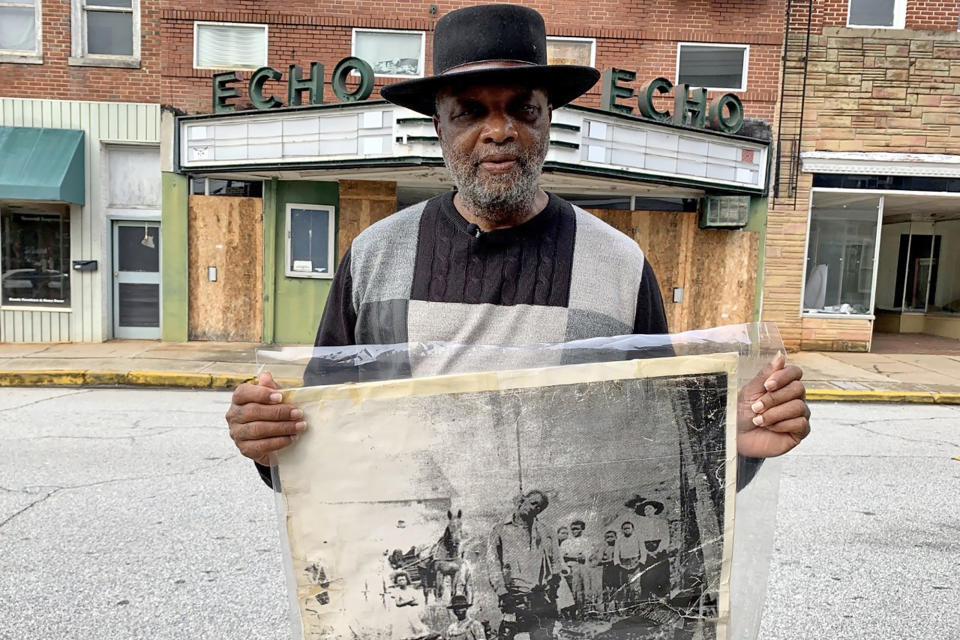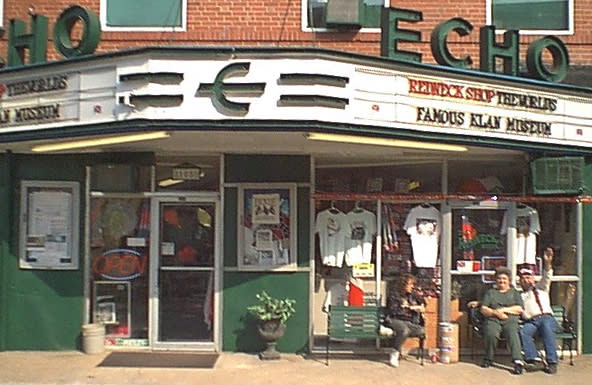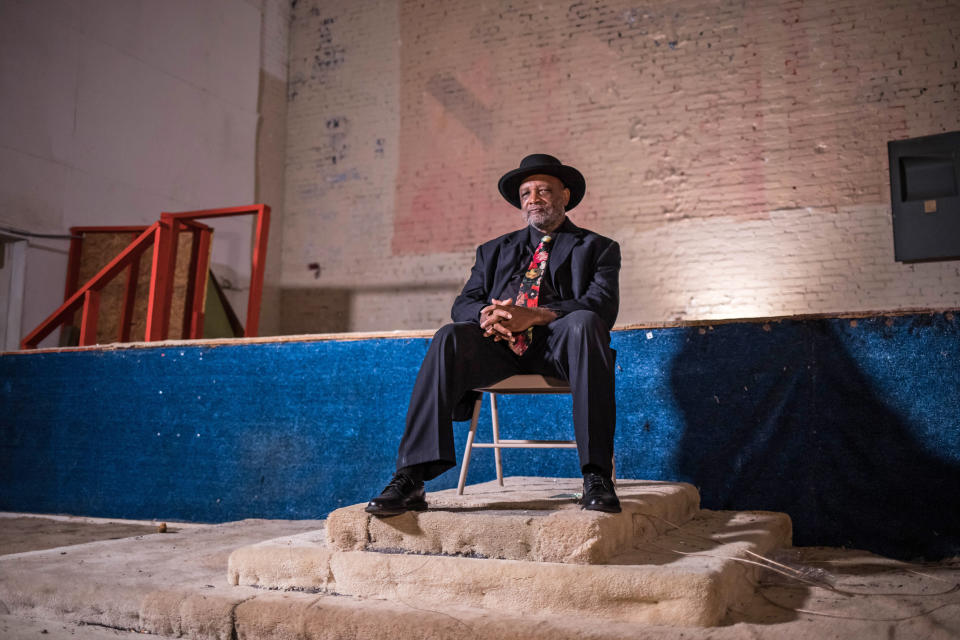A former KKK headquarters terrorized a town for years. Now it will become a diversity center
The Rev. David Kennedy remembers well what it was like growing up in Laurens, South Carolina, during the Jim Crow era. He lived in an apartment with his grandparents marked “C” for “colored” and was forced off sidewalks when white people would pass.
He recalls going into a shop one day as a kid to buy a collar for his dog, only to have an employee ask him, “Do you need one to fit your neck, too?” He tells the stories of Black people killed after being falsely accused of wrongdoing — including his great-great uncle Richard Puckett.
“August the 11th of 1913 is when they killed him,” Kennedy said, detailing what unfolded that day: Puckett, who could not read or write, was delivering a letter from his roommate to a young woman who turned out to be married. The woman’s husband saw the note and turned his wrath on Puckett. Puckett was taken to jail.
“A mob came and broke him out of jail, and they hung him up under a trestle,” Kennedy said. “They shot his body up real bad. We would see that rope hanging every time we would go under the trestle, because it was the main entrance to the Black community. They said anybody who took that rope down, the same thing that happened to Richard Puckett would happen to them.”

In the decades that followed, white residents would sell photos of Puckett’s lynching at the shop and give them to Black Laurens residents, telling them, “Stay in line if you don’t want this to happen to you,” Kennedy recalled.
Laurens, a city of 9,300 whose population is 56 percent white and 38 percent Black, has a history rife with racism and oppression for its Black population. Along with the daily discrimination residents like Kennedy faced, racist murders were common in the area. Black men were lynched and killed for false rape accusations to refusing to work on holidays.
So, while residents were outraged, it wasn’t entirely shocking when a self-professed Ku Klux Klan member, John Howard Jr., opened the Redneck Shop, a KKK museum, store and meeting place, in 1996 at an old segregated movie theater in the city.
The store sold KKK, neo-Nazi and white supremacist paraphernalia, like lynching photos, old grenades owned by the groups, pins, T-shirts and hats, one of which read “Original Boys in the Hood,” according to a 1996 report by The Washington Post. Supporters of the shop called it a symbol of “proud Southern heritage,” and one even defended the place with a shotgun.Over the years, the building became known as the “World’s Only Klan Museum,” according to the Anti-Defamation League, or ADL. Several white supremacist groups, including the National Socialist Movement, once the country’s largest neo-Nazi organization, held meetings at the building, according to the ADL. In 2006, the neo-Nazi and white supremacist group Aryan Nations held a raucous meeting at the building, and, a year later, the American Nazi Party held a post-rally celebration at the shop. Both the Klan and the American Nazi Party used the location to gather and recruit.

The shop would remain in operation, despite intense backlash and criticism from the city’s Black population, for 16 years before it finally closed in 2012. Now, Kennedy, a Black preacher, and Regan Freeman, a white man who grew up in Laurens County, about 60 miles northwest of Columbia, the capital, have founded the Echo Project — named after the original theater — and hope to transform what was once a symbol of hatred into a center for diversity and reconciliation.
“We started protesting heavily, and some of the young people wanted to burn the place down,” Kennedy said of the shop’s early days, noting that he prioritized nonviolent tactics to oppose the shop. “So this new place will be a place to encourage people. … We want to create an atmosphere where everyday people will feel the freedom to speak.”
Kennedy, 68, the longtime leader of New Beginnings Missionary Baptist Church, led protests and fervently opposed the store for years, even after the city’s outrage turned into resentful acceptance. The KKK targeted Kennedy as a result; it sold photos of his great-great uncle’s lynching and consistently threatened his church. It dumped dead animals onto the property, tried to throw handmade explosives into the building and left cards that read, “This is a social call by the Klan, don’t make this a business call.”
Ultimately, Kennedy developed a relationship with one of the shop’s owners, Michael Burden, who denounced the Klan and sold him the deed to the shop — but he could claim ownership only after Howard died. Kennedy gained complete control after Howard died in 2017, five years after the shop closed. Andrew Heckler’s 2018 feature film, “Burden,” chronicled Burden and Kennedy’s relationship.
Black former and current residents of Laurens are well-acquainted with the city’s racist history. Robert Fogge, now in his 80s, owned a barbershop behind the Redneck Shop and watched in fear as Klan members would go in and out of the building. In the ’90s, Klan members would stand outside John and Sara Latimore’s carpet business in their white robes to intimidate the couple. But residents said the racism stemming from the shop was only an extension of what they experienced in Laurens more broadly.
Stephen Peters, 63, was superintendent of Laurens County School District 55 for about four years beginning in 2016. At first he lived in Laurens, just 2 miles from Laurens District High School, but he moved to nearby Columbia because of the “blatant” and persistent racism he experienced. He recalled an instance in which a local business owner asked a school board member why the members would hire a Black man, using a racial slur to refer to him.
“I surely thought that we were beyond many of the things that I experienced when I lived in Laurens County,” Peters said. “I had people driving up onto my yard at 1 o’clock in the morning in trucks blaring their engines.”
The Redneck Shop opened the year Freeman, who co-founded the new venture with Kennedy, was born. He said he grew up hearing about the store but didn’t learn its significance until 2018, when he was a student at the University of South Carolina. He saw a TV special about the National Memorial for Peace and Justice in Montgomery, Alabama, a memorial for the thousands of Black people lynched in the South after the Civil War. A marker for Laurens County holds 11 names, including Richard Puckett’s. That, Freeman said, moved him to learn more about his home county’s history and to do all he could to promote justice. So he met with Kennedy, and the two decided to start the project.
“I think it’s crazy looking back now — the Redneck shop was open 15 miles from my house. I think a lot of people don’t understand the depth of what they were doing in that building,” Freeman said. “They were promoting nationwide and worldwide antisemitic and incredibly evil and racist organizations and materials.”
He added: “These people were active. It was not just a bunch of local kooks. These people were connected, they were promoting these things, and they were recruiting and growing — not only in Laurens, but nationwide.”
Howard, who had risen to the rank of grand dragon, said then that the shop and museum weren’t intended to promote hatred; instead, he said, it sought to educate the public about the KKK. However, the shop was frequently used for Klan meetings, and recruiters handed out Klan membership applications at the building, Howard told The Washington Post then.
The road to the Echo Project has been long and rough, and not everyone in the area supports the venture. Freeman chalks that up to critics’ simply not wanting to acknowledge Laurens’ history. Kennedy and Freeman say the new center will move Laurens to reckon with its history, and they have vowed to prioritize the stories of Black residents who endured the discrimination and violence, Freeman said.
The space will feature a museum along with the diversity center, but there’s still a long way to go. Freeman said there is still a large painting of a swastika on one of the building’s walls that the group must remove. The pair aim to officially open the center in late 2023, and they have enlisted the help of historians like Vernon Burton, a history professor at Clemson University, to make sense of the paraphernalia and documents left behind at the shop.

“What we are hoping that this will change is that this becomes a place that says we need to study these things, learn from them, get rid of hate and confront,” Burton said. “So we can somehow move together as a society. I have great hope for it. It’s not going to be an easy thing. But what Reverend Kennedy did wasn’t easy, either.”
Laurens Mayor Nathan Senn said the Echo Project is just the latest effort in a long process of Laurens’ progress. He highlighted that several Black women serve on the City Council and that the police chief is a Black woman. “These examples of our intentional focus on inclusivity and diversity could go on and on, but unfortunately, those facts have not been as widely publicized as the store, which closed its doors years ago,” he said.
Still, he said he’s not sure whether the renovated building will be a “source of healing” for the city.
“The theater and the shop which was located there have been closed for years, and even when the shop was open, it was something that people were not proud of and did not want associated with our town,” Senn said. “It was a place that welcomed people from all over the country who espoused views that were anti-American and hateful. So the publicity around the Echo Project itself has sort of reopened a wound that must be healed.”

